When buying a CD you actually buy two things; the plastic media and an implicit licence to play it. The plastic is a thing—a property, the licence is not. You cannot copy the content or play it for an audience; that is not part of the licence. This has been relaxed a little to allow the making of backup copies and alternative media for cars & MP3 players etc. but these copies do not contain the implied licence. If you sell the CD, the licence transfers with it. You can also give it away or bequeath it.
Unfortunately (!) there is no written copy of these licence terms anywhere, it is even worse than the shrink-wrapped licence terms on software. But, it is really no different to the situation that has always existed with books but few people thought of copying those – at least not in their entirety.
For this reason I have been careful to retain the physical media for all of my ripped digital (and analogue) music. These are the licences to own/play. If you sell or give away the original CD you should also destroy any ripped, duplicated or backup copy. You must not sell or give away any duplicates as these do not contain the implicit licence.
How about legitimate downloaded media—you don’t own it, it is a license to listen—a license isn’t property, therefore you can’t sell it. There is no physical media to which to attach the licence. I think the license is effectively for life—your life—so you can’t sell it, give it away or bequeath it. For this reason, even disregarding the production & distribution costs, downloads should be cheaper than physical media as they have a lower long term value. This may all be written into the iTunes and whatever terms and conditions, but I doubt it.
The public perception problem is that the button used to obtain the music is marked “Buy” not “Rent” or “Licence” which blurs the understanding.
If it is not “property” then you can’t steal it. You can be an unlicensed USER of a service, but you can’t STEAL it, you are not depriving someone of anything tangible.
There has been some discussion of this recently. Which Magazine raised the issue of a looming problem. What is going to happen to all of the digital media people have bought when they die? Children brought up on their parents music collection will suddenly find that is no longer available to them as it would have been when they had the physical media. There are issues of trying to transfer or merge accounts; something that the media companies either refuse or cannot do.
Matt Gemmell has an interesting article on his view of why piracy is rampant (beware strong language; so bad in fact, that I wish I didn’t have to link to it) and he has a good point but blurs the ethics somewhat. I agree that almost everyone wants to be honest, but the tipping point is not price. If something is just expensive then we go without. The thing that tips us over the edge is being ripped off. For example being made to pay over and over again for the same thing just because the distribution format has changed; just like we used to copy our records to cassette to play them in the car. Or, as in the example above, being made to pay again because the original owner has died. Curious Rat comments on this and mostly misses the point. First piracy is not theft, you need to understand the difference, but also he twists the arguments back in ways that the original author never intended (nor said). I don’t think Matt would object to you pirating his iPhone app if the DRM gets in the way—so long as you have paid for it in the first place.
Some related points…
When they talk about Intellectual Property (IP) Rights, that really refers to the full rights which includes copying, marketing and distribution.
Re-digi have tried creating a market for “used ” iTunes—by ensuring that all copies from the seller were deleted. I think they are just creating a honey-pot for lawyers.
An interesting point is that “used” copies are indistinguishable from “new” ones which is what worries the retailers; why buy a new one if you can’t tell the difference.






 Webmaster
Webmaster